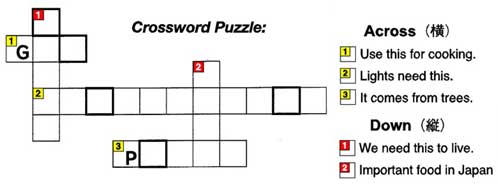外国でも平和を話し合うために
  Happy Valentine's Day, everyone ! 米国ではバレンタインデーは、みんなが互いにチョコレートやプレゼントを交換します。3月のホワイトデーはありません。 前回のテーマ「仕事」への応募ありがとうございました(パズルの答えはWORKです)。広島市西区のMURATAさん、おめでとうございます!仙台市の子ども病院に就職が決まったそうです。頑張ってください。広島県府中町のSOS男さんはすてきなメッセージをくれました。どんな仕事でも世の中や人のためになっていれば、素晴らしい仕事なのだ、と。 |
前回の日本語訳
ベックさんのコメント
105号クロスワードパズルの正解はこちら >> |
|
今回の課題は、特集面のテーマと同じ「もったいない」です。パズルも、無駄にしてはいけないものについてです。 最後に残念なお知らせをしなければなりません。「英語に挑戦」は次回で終わります。課題もパズルも今回が最後となります。モッタイナイです。次回のエッセーで詳しく書きますね。 |
"Mottainai"
| Of course, it's important to think about "mottainai", to do our best to save energy and use things well. One way to remember the importance of this is to keep in mind how lucky we are compared to many people in the world. In some countries, for example, people don't have water in their homes. In fact, to get water, they have to walk a long way with a big container and carry it home on their backs or on their heads. Sometimes even children have to walk hours each day to do this. So the next time you turn on the water at home, remember how fortunate you are and think about "mottainai" in your own life. |

※締め切りは2月20日必着です。抽選でプレゼントを用意しています。
全部の項目に書き込んだら、最後に送信ボタンを押してね!
 アダム・ベック
アダム・ベック
